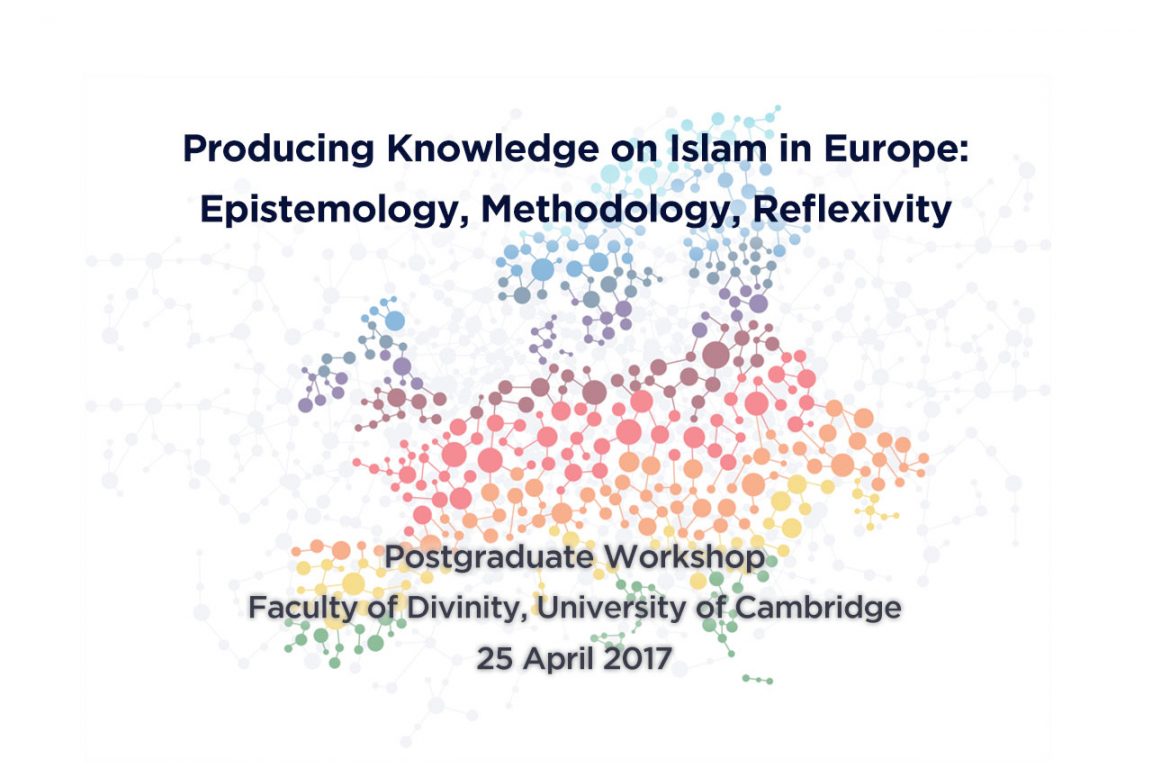Producing Knowledge on Islam in Europe: Epistemology, Methodology, Reflexivity

About The Event
Postgraduate Workshop
Date: April 25, 2017
Venue: Faculty of Divinity, University of Cambridge, West Rd, Cambridge CB3 9BS, UK
Organized in partnership between postgraduates at SOAS and the University of Cambridge, and kindly sponsored by the British Association for Islamic Studies and the Department of Politics and International Studies (Cambridge), this workshop will bring together established academics and postgraduate students at an advanced stage of their research to explore challenges and suggest solutions for researchers working in the field of Islam and Muslims in Europe.
Overview
This inter-disciplinary workshop addresses the related themes of epistemology, methodology, and reflexivity, which have frequently arisen when problematizing our respective productions of academic knowledge, such as the multiple forms of insider-outsider negotiation for both Muslim and non-Muslim researchers, various issues of access, trust and representation, and the politicization of the Muslim subject in a security-saturated cultural context.
We anticipate engaging with some of the following questions:
- Epistemology: Which concepts are useful? For example, how can researchers critically engage with terms such as orthodoxy or Islamism? How can we make best use of paradigms rooted in other fields, without diluting the Islamic quality of the research object? What is the heuristic value and analytical relevance of the category ‘Islam’?
- Methodology: What consequences can choices about methodological praxis have for the production of knowledge in our research? How do we negotiate access, build trust and manage good fieldwork relationships in a politicized environment? What are the best strategies for managing limitations in methodological praxis?
- Reflexivity: How do researcher identities impact on research? How should researchers engage with social actors regarding the production of our work, and why? To what extent is it possible to manage research independence when working with organizations and institutions?
Objectives
The workshop aims to:
– Offer doctoral students from a range of disciplines an opportunity to share how they have navigated issues of epistemology, methodology and reflexivity, and receive feedback on how they can write it up.
– Bring together postgraduate students at various stages of their research for wide-ranging discussions about their roles and challenges as researchers.
– Learn from established academics about navigating and analyzing these issues.
– Develop the state of knowledge and understanding of these issues through mapping and evaluating existing praxis.
– Develop the workshop findings – from presenters, discussants and the audience in general – into an article for wider reference.
Schedule
- Keynote
– Dr Frank Peter (Hamad Bin Khalifa University)
Local Islam in secular France: Modelling the processes of interaction
- Methodology
– Asma Khan (University of Cardiff)
Reflections on Establishing and Maintaining Fieldwork Relationships As An Insider-Outsider Within a British Muslim Community
– Adela Taleb (Humboldt University of Berlin)
Making strange what seems familiar: Ethnography in question
– Dr Paul Anderson (University of Cambridge), Discussant
- Epistemology
– Hira Amin (University of Cambridge)
Fundamentalists, progressives and everything in between: the perils of labelling ‘the Muslim’
– Emanuelle Degli Esposti (SOAS, University of London)
Muslim Subjects or Subjects of Discourse? A Lacanian Approach to the Study of Muslim Identity in Europe
– Professor Humayun Ansari (Royal Holloway, University of London), Discussant
- Reflexivity
– Margot Dazey (University of Cambridge)
Researching a highly-politicized topic: fieldwork politics on French Islam
– Alyaa Ebbiary (SOAS, University of London)
‘My people’: Ambivalence and Loyalty for the Insider-Outsider
– Dr Caroline Osella (SOAS, University of London), Discussant
- Concluding remarks
Dr Sara Silvestri (University of Cambridge)
Source: Eventbrite.com
Location
Faculty of Divinity, University of Cambridge


We're always eager to hear from you.
If you’d like to learn more about us or have a general comments and suggestions about the site, email us at